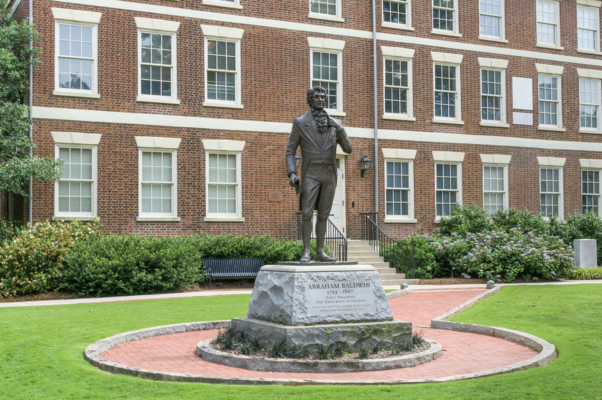As the weaknesses of the Articles of Confederation became obvious, America’s leaders decided a stronger document was necessary to address serious issues and called for the Constitution Convention.
Each of the 13 states was allowed to send seven delegates but could only cast two votes. Georgia elected six, but only three attended (Abraham Baldwin, William Houstoun, and James Habersham at the onset, and later, William Few). Sixty-five men were chosen from the states, while only 55 showed up. The convention lasted so long; only 39 remained to sign the completed document (Abraham Baldwin and William Few for Georgia). Rhode Island sent no representatives and New Hampshire came too late to make a difference. The reason for the spotty attendance was the men had to pay their own way and many could not afford to leave businesses for an extended period of time.
Abraham Baldwin, a Connecticut native, but Georgia transplant, was selected right away by his adoptive state. He had served in the state legislature in 1784, not long after his arrival. Until his death in 1807, he remained in public service, as a State Representative, a U.S. Representative, and a U.S. Senator.
After deciding on many things, including three branches of government, the convention stalled over state representation. The issue was between the “large” states – measured by population (Massachusetts, Pennsylvania, Virginia, North Carolina, South Carolina, and Georgia) – and the “small” states of New Hampshire, Connecticut, New York, New Jersey, Delaware, and Maryland.
The attendees agreed rather quickly to have two houses. They also decided the lower house would be represented by population. The higher the population, the more representatives could be elected.
The contention came when the larger states wished to have the senate formed exactly the same way – the number of senators based on the state’s population. The small states felt this gave the larger states an unfair advantage for legislation while the larger states feared the smaller ones could control them with equal representation. After a long and heated debate, the end result was a complete stalemate.
However, as time dragged on, a vote was called anyway. Votes were cast geographically. Therefore, Massachusetts cast the first two. Each state voted in descending order, from north to south, with Georgia casting the final two votes. After the other states had voted, the count stood at 5-5.
Normally, Georgia voted with the larger states, but this time, Abraham Baldwin recognized the impending crisis. With Georgia’s two votes, the larger states would win and win big, which could cause the smaller states to pull out and destroy the new union. Instead, he cast his vote for the smaller states, while his colleague, William Houstoun, voted, as usual, with the larger states, thus creating a 6-6 tie.
This gave the delegates time to cool down, relax, reflect and reconvene a few weeks later. Fortunately, this happened a few days before July 4th. The new country was infused with patriotism, giving the delegates something to mull over on how to save it. The vote eventually agreed with the smaller states, giving each state two senators and two votes, as it is to this day.
Abraham Baldwin’s ability to measure a situation and think it through saved the Constitution Convention of 1787, as well as the new United States of America.
The Convention of States Georgia team seeks to honor Baldwin's legacy today as the first state to pass the resolution to call an Article V Convention of States.
Our expanding team of grassroots activists supports efforts to end federal overreach, and we also look to strategically root out tyranny wherever it may potentially attempt to rear its ugly head, especially in our home state.
We will also continue to happily team up with the telepatriot missions of our fellow states who are still looking to pass the Article V resolution. We are cheering you on!
Together, we can return this nation to its roots of self-governance.
Note: Credit is due to E. Merton Coulter's "Abraham Baldwin: Patriot, Educator, and Founding Father" for historical facts and reference material. For further information on this very important Founding Father, we recommend checking out Mr. Merton's work!


